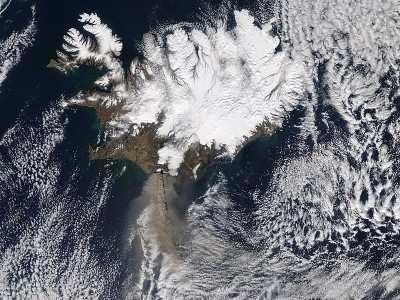Fri, Apr 23, 2010
IATA Urges Measures To Mitigate Impact
 The International Air Transport Association (IATA) estimated
that the Icelandic volcano crisis cost airlines more than $1.7
billion in lost revenue through Tuesday-six days after the initial
eruption. For a three-day period (17-19 April), when disruptions
were greatest, lost revenues reached $400 million per day.
The International Air Transport Association (IATA) estimated
that the Icelandic volcano crisis cost airlines more than $1.7
billion in lost revenue through Tuesday-six days after the initial
eruption. For a three-day period (17-19 April), when disruptions
were greatest, lost revenues reached $400 million per day.
"Lost revenues now total more than $1.7 billion for airlines
alone. At the worst, the crisis impacted 29% of global aviation and
affected 1.2 million passengers a day. The scale of the crisis
eclipsed 9/11 when US airspace was closed for three days," said
Giovanni Bisignani, IATA's Director General and CEO.
IATA noted there are some cost savings related to the flight
groundings. For example, the fuel bill is $110 million a day less
compared to normal. But airlines face added costs including from
passenger care. "For an industry that lost $9.4 billion last year
and was forecast to lose a further $2.8 billion in 2010, this
crisis is devastating. It is hitting hardest where the carriers are
in the most difficult financial situation. Europe's carriers were
already expected to lose $2.2 billion this year-the largest in the
industry," said Bisignani.
"As we are counting the costs of the crisis we must also look
for ways to mitigate the impact. Some of our airport partners are
setting industry best practice. London Heathrow and Dubai are
waiving parking fees and not charging for repositioning flights.
Others airports must follow," said Bisignani.
But Bisignani says the larger role is for governments.
He made three specific requests for regulatory relief:
- Relax Airport Slot Rules: IATA urged that rules on take-off and
landing slot allocation (use it or lose it) be relaxed to reflect
the extra-ordinary nature of the crisis.
- Lift Restrictions on Night Flights: IATA urged governments to
relax bans on night flights so carriers can take every opportunity
to get stranded passengers back home as soon as possible.
- Address Unfair Passenger Care Regulations: "This crisis is an
act of god-completely beyond the control of airlines. Insurers
certainly see it this way. But Europe's passenger rights
regulations take no consideration of this. These regulations
provide no relief for extraordinary situations and still hold
airlines responsible to pay for hotels, meals and telephones. The
regulations were never meant for such extra-ordinary situations. It
is urgent that the European Commission finds a way to ease this
unfair burden," said Bisignani.

Ash Cloud From Eyjafjallajokull Vocano Taken
4.17.2010
NASA Photo
Bisignani also urged governments to
examine ways for governments to compensate airlines for lost
revenues. Following 9/11, the US government provided $5 billion to
compensate airlines for the costs of grounding the fleet for three
days. The European Commission also allowed European states to
provide similar assistance.
"I am the first one to say that this industry does not want or
need bailouts. But this crisis is not the result of running our
business badly. It is an extra-ordinary situation exaggerated with
a poor decision-making process by national governments. The
airlines could not do business normally. Governments should help
carriers recover the cost of this disruption," said Bisignani.
More News
Airport Rotating Beacon A visual NAVAID operated at many airports. At civil airports, alternating white and green flashes indicate the location of the airport. At military airports>[...]
Aero Linx: Fly for the Culture Fly For the Culture, Inc. is a 501(c)(3) non-profit organization that serves young people interested in pursuing professions in the aviation industry>[...]
Klyde Is Having Some Issues Comprehending The Fed's Priorities FMI: www.klydemorris.com>[...]
Also: Viasat-uAvionix, UL94 Fuel Investigation, AF Materiel Command, NTSB Safety Alert Norges Luftsportforbund chose Aura Aero's little 2-seater in electric trim for their next gli>[...]
Also: EP Systems' Battery, Boeing SAF, Repeat TBM 960 Order, Japan Coast Guard H225 Buy Despite nearly 100 complaints totaling millions of dollars of potential fraud, combined with>[...]
 ANN's Daily Aero-Term (04.25.24): Airport Rotating Beacon
ANN's Daily Aero-Term (04.25.24): Airport Rotating Beacon ANN's Daily Aero-Linx (04.25.24)
ANN's Daily Aero-Linx (04.25.24) Klyde Morris (04.22.24)
Klyde Morris (04.22.24) Airborne 04.24.24: INTEGRAL E, Elixir USA, M700 RVSM
Airborne 04.24.24: INTEGRAL E, Elixir USA, M700 RVSM Airborne 04.22.24: Rotor X Worsens, Airport Fees 4 FNB?, USMC Drone Pilot
Airborne 04.22.24: Rotor X Worsens, Airport Fees 4 FNB?, USMC Drone Pilot




